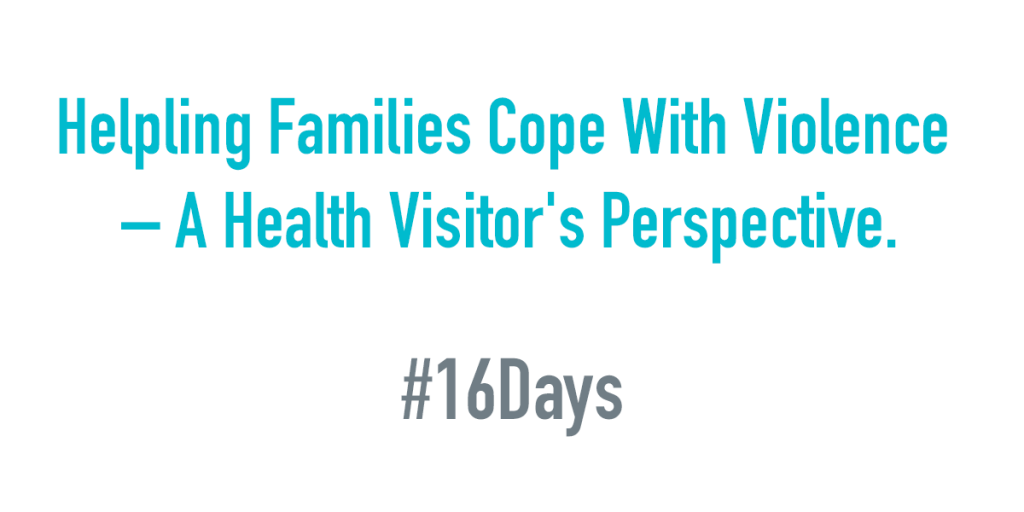Dr. Tanya Dennis (PhD BSc, MSc, RGN, RHV, FETC) is a Health Visiting Specialist/Domestic Violence Lead /MARAC Representative.
Domestic Violence and Abuse (DVA) is an important health issue which impacts on the health and well-being of a significant number of individuals and their families. As providers of universal services in pregnancy and the first five years of life, this means they are often the first health professionals to be aware of domestic violence and hidden harmful practices in the family.
The literature and my experience in the field has highlighted that DVA rarely exists in isolation from other social ‘ills’ and as such is a major risk factor for psychiatric disorders . Effects include mental and physical injuries, homelessness, loss of opportunity and lowered self-worth. DVA is detrimental to children’s welfare, a central issue in child protection and it forms a significant part of my role.
Domestic violence and abuse is an area in which health visitors have significant potential to contribute to the wider domestic violence agenda.
Victims of DVA have universal contact with the health visiting service and as such the service is less likely to be stigmatising which creates unique opportunity. By going to people’s homes, seeing families face to face, we contribute to detecting DVA and take appropriate actions. As public health workers we understand a great deal about the community and the lives of the people we serve.
We have an ongoing relationship with the family. Pregnancy and early parenthood is a vulnerable time for the family and the time when a victim is more likely to disclose abuse to a professional with whom they have a supportive relationship. A woman fleeing domestic violence will often present with a complicated range of issues which will not fit neatly into health categories and thus a multi-agency collaborative working approach is vital in ensuring that client needs are met.
Evidence indicates that early identification, risk assessment and safety planning are effective strategies to prevent damaging patterns of behaviour being established and have the potential to strengthen the relationship within the family. Raising awareness of domestic violence in the ante-natal and post-natal period is essential and highlights the critical role we as health visitors play in the field of DVA. This will involve identifying risk of harm to children, routine enquiry into DVA, assessment of risk and protective factors, building client’s resilience and coping strategies, support and appropriate signposting.
Staff are encouraged to consider the needs of the perpetrator as this can increase the safety of the victim and their children. Domestic Violence training provided to staff ensures staff feel confident and competent in recognising and addressing family violence and responding to the challenges of DVA.
Jasmina’s Story
This is a story about Jasmina, a 26-year-old Asian woman. Jasmina was married to Yasir, her cousin, for the past 6 years. They had 3 young children and a baby on the way. The family had recently moved in to the area and lived in a small rented flat. When reviewing her health records we could see that Jasmina had limited contacts with health services in the previous borough that she had lived in.
During my first visit, Mum appeared very suspicious of me. The children appeared well although a bit subdued. I undertook routine enquiries about the family; domestic violence (DV) was not highlighted as a concern and Jasmina did not disclose any domestic violence.
Two months after the initial visit, a Merlin* – police report was assigned to me highlighting a serious domestic violence incident perpetrated by Yasir on his wife. Yasir was arrested but Jasmina would not support police action, like many victims of abuse involving the police or courts can be very scary. During my next visit Jasmina minimised the incident which was reported by her neighbour.
I left the meeting after having a brief conversation about the specialist support that was available for victims of abuse and assured Jamina that if she would like to access support I would assist her with contacting these services.
One month later, her GP contacted me. Jasmina had come to see the GP and had bruising on her arm and neck. Her husband was present at the consultation. Jasmina, when asked, denied she was experiencing domestic violence. In my experience, most victims of domestic violence would deny that they are experiencing DV if they were asked that question in front of their abusive partner. Or even if the partner was not present during the questions, their ‘presence’, is acutely felt by the victim, with many perpetrators of abuse focussing on convincing the victim that they have the ability to see health records, be told everything that is said in meetings with other professionals and they have the right to know everything about their partner.
When I next saw Jasmina during a home visit she minimised the incident. Children’s services had contacted and visited Jasmina but had closed the case with no further action being taken.
Jasmina was ready to talk about what had been happening, and she just needed to find a person she could entrust this information to.
We had a long chat about domestic violence and the impact on her and her children. I told her that she is not alone, that she is not to blame for what is happening to her and that she and the children do not deserve to be treated in this way. I explained to her that there is help around and I provided her with the police and DV service’s contact numbers.
Two months later, I received a frantic call from Jasmina. She said that her husband had hit her on her face causing bruising and punched her in the stomach, strangled her bruising her face and neck and causing her to lose consciousness. Yasir was arrested and removed from the property. When I saw her at home a couple of days later Jasmine appeared very anxious and vulnerable. She disclosed a lengthy history of abuse by her husband and his family.
Since her husband was arrested, she has decided to separate from him. Jasmina told me that her husband sent a message to her that he will pour petrol over himself and set himself alight if she pressed charges against him. He also threatened to kill her and the children.
Her relatives were not supportive of separation and attempted to convince her to remain in the marriage.
My priority was to assess Jasmina’s safety and that of her children, to provide information, advice and intervention strategies to Jasmina to enable her to access specialised services and to ensure children are not ‘invisible’ .
I was concerned that Jasmina was at risk of honour based violence and that children are witnessing and being caught up in the abuse. The impact of DVA on the children and on unborn baby was my primary concern.
After discussing the work that social services can do to support families with Jasmina and attempting dismantle the idea that social services only take children away, a message that Jasmina’s husband had continued to say to her. I referred the family to Social Services , MARAC and introduced the IDVA service, refuge and support services.
Jasmina has now engaged with a domestic violence specialist support service, she is still living in the family home. Yasir remains in custody pending the court case and the children have started school and nursery school. Jasmina is nervous about the pending court case but we have arranged for her to have a pre-court visit and meet the witness service before the court case, and we will be requesting an indefinite restraining order to prevent Yasir contacting Jasmina again. The IDVA has introduced her to a family law solicitor who is representing in her divorce and will act on behalf of Jasmina to set up future child contact between her children and their father.
‘This is a great example of the amazing work that the health visiting service does. They are often the first professionals that a victim of abuse meets that will ask questions about domestic abuse and sexual violence in a routine but conversational manner. We receive many referrals from the health visiting service. Survivors often say that they were waiting for someone to ask them the question and once their health visitor did they felt safe and supported enough to disclose what they have been experiencing’. – IDVA Service Manager
*Merlin report: Merlin is a database run by the Metropolitan Police that stores information on children who have become known to the police for any reason. This can range from being a victim of bullying to being present whilst a property is searched, this may be with a warrant or under the Police and Criminal Evidence Act
As Health Visitor who is the Domestic Violence Lead, I contribute to Trust wide domestic violence and abuse strategy. Health Visitors advocate for clients at various community forums and we promote a link with the voluntary sector allowing for multidisciplinary work. We work closely with partner agencies, providing visiting support for the Hestia Women’s Refuge in Harrow and all of the other refuges in the United Kingdom as well as homeless accommodation and we work with action groups in the community.
In Harrow health visiting currently co- facilitate the community based parallel therapeutic groups for survivors of DVA and their children. Evaluation of the programme has shown that the mother who attended are more effective in protecting their children from further DVA as they were more likely to access services and report a crime.
As the Domestic Abuse Lead I represent NWL NHS Trust at Harrow Domestic Violence Forum and Multi-Agency Risk Assessment Conference (MARAC) meetings ensuring that the voice of the child is heard.
The current climate presents challenges when it comes to DVA however I am convinced that health visiting in uniquely placed to respond to these for the good of the client.
[maxbutton id=”6″ ] [maxbutton id=”9″ ]



